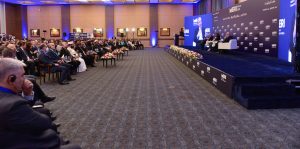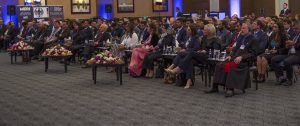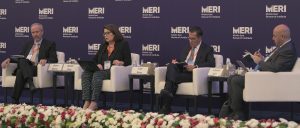Crystal-Gazing the Middle East: Power Dynamics & Power Alignments
- Vali Nasr, SAIS, Johns Hopkins University, USA
- Randa Slim, Middle East Institute, USA
- Steve Bitner, The Bureau of Near Eastern Affairs, Department of State, USA
- Lukman Faily, Iraqi Ambassador to Germany (Moderator)
In this session (at MERI Forum 2022) Ambassador Lukman Faily set the scene by describing how the global and regional power dynamics changed from a bipolar system to a unipolar one, and now to a multi-polar system again (click here for video of the session in full). The Middle East and North Africa (MENA) witnessed tremendous shake ups, ranging from Arab Spring to regime changes and to emergence of new regional powers, accompanied by the failure of several states. Global powers, such as China and United States have overlapping domains of influence and interest, including our region. While the region is subject to global power influences, there are threats from the region outwards, in the form of instability that led to increased migration or terrorism. Amidst these incredible changes, there is ambiguity as to the type of alignment one can foresee in the next few years and decades.
Vali Nasr, of Johns Hopkins University, thought that “we’re in a very interesting time period for this part of the world”. While the region witnessed major conflicts, such as the war on Daesh, the Middle East is being impacted significantly by bigger changes that are happening around the world, including the war between Russia and Ukraine. A conflictual relationship between the US and China can potentially lead to a showdown over Taiwan, sooner than later. Therefore, “the Middle East conflicts right now are, for the first time, not top of mind in the West”…. and the lion’s share of American military and diplomatic resources are being dedicated elsewhere. He also believed that while the Middle East is not in the center of the big conflicts, “the region is playing much more of a balancing role in these conflicts”. Nasr gave examples of how Iran’s intervention in Ukraine, or Saudi Arabia’s decision to side with Russia over price of oil and OPEC+, have had big impacts.
In Nasr’s opinion, these do not mean the United States is going to leave the region. “The choice is not between black and white, but that the nature of its involvement, commitment, role in problem solving, etc. is going to shift drastically. But, the most immediate impact of this is that everybody in the region has started to recalibrate and sort of understand what the new chessboard is”. Countries that previously refused to talk to each other are now engaging each other and jockeying for positions. For instance, despite all of their conflicts, the UAE has sent its ambassador back to Tehran. Kuwait, Saudi Arabia and Iran have been communicating. And Turkey and the Gulf countries have mended fences. Turkey, Iran, Israel, Saudi Arabia in various ways are competing for influence, particularly in countries that are weaker in the region, in Iraq, Syria, Lebanon, etc. In some places they cooperate, while in others they don’t. There are also some surprises, like Lebanon and Israel arriving at an agreement over maritime borders, which would not have happened without, “Iran’s approval”, while relations between Iran and Israel have been getting worse.
This means, “without the US dictating or providing a certain framework, countries are basically pursuing their interests differently, which makes a very complicated situation”. Some of these deals are opaque and or not quite understandable in the West. Interestingly, Nasr added, “China and Russia are much more involved in these sorts of three-dimensional game of chess more than they were a decade before”. In the current political environment, Nasr opined, it is hard to predict where the Middle East is going. The US-Iran relations have been spiralling downwards over the past decade or so, worsened by the recent stagnation in the nuclear deal, the Ukraine war, Iran’s internal protests and Iran-Israeli rivalry.

Building on these, Randa Slim of the Middle East Institute, believed that for the first time in two decades, the political, security and economic trajectories of the MENA countries are being impacted by a conflict outside their geographical territory. The non-oil and -gas producing countries are feeling the shocks in terms of food and energy security. But at the same time, the war in Ukraine is hardening of global geopolitical fault lines between the West and Russia, which has given the MENA region space to carefully balanced relationships with both sides.
Slim described new trends that might evolve in the future. The priority focus and major challenge throughout the MENA region will remain on the economic, energy and climate agenda. The longevity of this stress is dependent on the duration of the Ukraine war and the sanctions imposed on Russia. Here, there are winners and losers. The winners are the oil and gas producing countries, which, according to the International Monitory Fund (IMF), the Gulf and central Asian oil- and gas-producing countries are expected to have a windfall in the next four years of about $1 trillion from higher energy prices. The losers are the poorer countries: Egypt is experiencing major economic shocks, food crisis and energy crisis; and countries like Lebanon, Syria, Yemen, Tunisia, Morocco, Jordan, which are experiencing difficulties with governance are likely to become worse off.
According to Randa Slim, there was an old pattern of regional engagement by the Gul Arab states, consisting of “throwing money” at crises. In 2013, Saudi Arabia, Kuwait and the UAE assisted Egypt with $35 Billion, to ease the fiscal crisis, after President Morsi was ousted by President Sisi. Today, a different pattern of engagement is emerging. The Saudi Crown Prince, Mohammed bin Salman, announced the formation of five regional companies (worth $24 billion) that are going to invest in six countries in the region, including Iraq and Egypt, in real estate constructions, telecommunications and other infrastructure developments. This pattern shifts away from the decade long conflicts, confrontation and instability, that started with the Arab Spring, to a decade of regional integration, cross-border trade, and economic coordination.
Another emerging trend, described by Slim, is a combination of a de-prioritization of the MENA region by the United States that has been in the making since the Obama administration. De-prioritization does not mean exit, retreat, or withdrawal. We are going to witness more of the broad détente between Arab countries, Iran, Turkey and Israel after the Abraham Accords. “The wildcard here is going to be what happens in Iran”, said Slim. The current uprising is serious and “expresses a deep break in Iranian society, between the regime and a big segment of the Iranian population, primarily youth”.

Steve Bitner of the Bureau of Near Eastern Affairs, Department of State, commented on the Iran protests, suggesting that it is going to have major implications on this broad détente and rapprochement that are evolving in the region. He emphasised that the way “the regime is going to deal with [the protests] is still unfolding`”…. It can either lead to some change, not regime change, but rather to some de-prioritization of their international affairs, of their regional intervention, focus more on domestic issues, bringing to the fore reform minded leaders, or it can lead to a more activist foreign policy, more intervention in the region. It can go either way”.
Bitner indicated that the classical international alignment with Washington in the Middle East is no longer the de factopolicy position. There is a drive among regional countries, especially Gulf Arab countries, for diversification in relationships with other powers, including Russia and China. There are fragile and failed states in the Middle East. Iraq and Syria still have major problems, while Lebanon is on the brink of total collapse. The on-going refugee crisis and governance issues are going to continue to create challenges to countries. Conversely, there is an area for cooperation. The “maritime border agreement … between Lebanon and Israel, provides a template for conflict resolution in the region that is transactional, issue-specific, win-win, with the mediation of the United States”, Bitner added. Both the United States and the region are going to eschew grand designs in terms of conflict resolution and focus on specific issues which can lend themselves to win-win approach. These, can “serve US national interests, but at the same time can serve the interests of the region”.
Steve Bitner cited President Biden’s framework of the US National Security Strategy, released on October 12th, 2022, which reaffirmed that the US remains deeply committed to the Middle East, and have “enduring interests here”. The US remains “focused on regional peace, stability and prosperity” and to developing its “deep and strategic partnerships with countries across the Middle East”. He pointed to the global challenges that drive the US global agenda and inform its policies in the Middle East, including “Russia’s invasion of Ukraine, China’s attempts to reshape the international order and the existential threat of climate change”. He emphasised that “we can really only tackle these challenges working together as partners”.
The states that will be best equipped to meet the major challenges like COVID 19 pandemic and climate change, will be those with resilient governments. Resilience, in US perspective, comes mainly from “being inclusive, treating civil society as a partner rather than a threat, respecting human rights and the fundamental freedoms of all people, and building and maintaining the trust of citizens”. Hence, “the US will not waver from promoting these values, promoting democracy and promoting the institutions that provide rule of law and good governance”.

Climate change is affecting the entire globe and has besieged the Middle East. Food insecurity, high temperatures, severe water shortages are all having devastating impacts on societies and economies. Bitner thought there is a unique opportunity for the Gulf countries to launch a new era of climate-smart initiatives in which the Middle East can take a leadership role in the world’s energy transition. “No solution to the climate crisis will be sustainable without the participation of the region’s critical energy producing states”, he added.
According to Bitner, the US also supports building strong regional partnerships through regional integration, emphasizing that his government does not expect regional partners to share the same worldview or assess each challenge in the same way as the US. However, the US is “committed” to working with its partners to advance the shared interests, and remain committed to its military partnerships in the region. The US military posture, Bitner stated, is evolving to focus on deterrence, strengthening partner capacity, countering terrorist threats and ensuring the free flow of commerce. “We will not use our military to change regimes or remake societies, but instead limit the use of force to protecting our mutual interests and enabling our partners to defend their territory from external and terrorist threats. This change is good for us, for the United States, and it’s better for the region as it supports regional and national stability”.
In terms of Iran, Bitner explained that the US believes that “the Iranian government is sowing instability across the region …. brutally suppressing the rights of the Iranian people. We remain committed to supporting the Iranian people’s demands for human rights and basic dignity, to countering the threat from Iran, and to ensuring Iran never acquires a nuclear weapon. We remain alert to the range of threats from Iran …… Against such a threat, partnerships matter. We applaud Iraq for their October 12th vote at the UN to condemn Russia’s illegal annexation of Ukrainian territory.
Steve Bitner went on to address the implications of the US competition with China in the Middle East. “We do not expect every country to have the exact same assessment of China as we do. Our competition with China is not about a new Cold War. It’s not about dividing the world into ideological blocs or forcing countries to choose between the United States or China. It is about upholding an international order that ensures security, fairness and transparency in the competition for ideas and commercial interests. The alternative, offered by China, asks countries to submit to opaque investment that leaves them in debt, stokes corruption, harms the environment, fails to create local jobs or growth, and can compromise countries exercise of their sovereignty”.
Finally, Bitner ended his presentation by stressing that “Iraq is very much at the center of these issues and of the President’s vision for the region. As a member of the GCC+3, Iraq is contributing to a central coordination and decision making in the region. We encourage Prime Minister Sudani to build on his predecessor’s efforts. To continue to integrate Iraq into the region, which will ultimately enhance its economic growth, help its environment and facilitate further cooperation. We believe this interdependence can form the foundation of a lasting peace. As President Biden said at the GCC+3 summit in Jeddah in July, we will not walk away from the Middle East and leave a vacuum to be filled by China, Russia or Iran. America’s interests are interwoven with successes of the Middle East”.
During the Q&A part of the session, Vali Nasr commented: “the United States has at least given up on the idea that it will proactively try to shape the direction of things in the region”. He believes that the war in Ukraine can get worse and precipitate a much bigger set of conflicts with China over Taiwan. In which case, the US would have too much on its plate to shape the future of the Middle East in a proactive way. If the war in Ukraine winds down, the United States will go back to what started with President Obama, pivoting to Asia.
Nasr added that the Middle East countries are only learning how to interact with one another to manage their own issues, but don’t have really any mechanisms of doing so. The US, on the other hand, “has not really been very successful in the Middle East when it has had big projects, such as trying to bring democracy to the region or creating liberal Islam. Iraq and Afghanistan loom very large in the minds of American public, not as success stories, but actually as cautionary tales of overreach”. Therefore, the US will engage where it must, and will be supportive of positive developments. It will try to influence the region. But it also is likely to have a much more conflictual relationship even with allies over Russia and China”. The perception in the US is that Saudi Arabia sided with Russia, which is suggestive of a very different kind of a US-Saudi relationship. “In some ways Saudi Arabia is not different from Germany or Japan who have doubts about US security commitment, Nasr added.
On the Iran nuclear deal (JCPOA), Vali Nasr opined that the US chief negotiator, Rob Malley, believes that the US is not necessarily interested in the nuclear deal anymore. Instead, they are supporting the protesters. In Tehran, the JCPOA is also at the back burner, and the issue of protestors is at the front burner. Iran is currently in a siege mentality, feeling like being attacked. “JCPOA may be dead as a particular deal, but the problem that JCPOA was going to address is still on the table and it could get much more dangerous. Iran’s nuclear program is still there. They are very close to a threshold. They may cross the threshold. The questions that are still hanging: what would Israel do about it? What would the US do about it? What does it take to get the Iranians not to get to that point in time. What will Iran look like when it becomes a threshold state?”

On the US relations with the Kurdistan Region, Randa Slim said: I’m an old and big friend of Kurdistan and I’ve always looked at it as a model for the region where we can experiment with, show the rest of the region tolerance, inclusivity, respect for human rights and better governance. I had very high hopes in the KRI, with the talents and the people available. However, I have serious concerns about corruption, freedom of expression and human rights. Unfortunately, this is more and more occupying a big space of the narrative in the in the US”.
Steve Bitner emphasised that the KRI is a great partner of the United States and their relationship goes back to many decades. “We look to have a productive and multifaceted partnership with the KRI, we want to see more US companies doing business here. We want to see a more interconnections between people-to-people connections taking place. We definitely want to see a KRG that protects human rights, the freedom of journalism.”
According to Bitner, the US values having a productive and cooperative relationship between Kurdistan region and Baghdad. “And we have many conversations with folks to try to help bring that to realization”. He reiterated that the US has not left Iraq. “In many private meetings with Iraqi officials coming to Washington DC, one of the major talks is about the good partnership with Iraq and implementation of the Constitution”……“the United States values having a productive and cooperative relationship between Kurdistan region and Baghdad,” and it helps both sides to reach an agreement.

